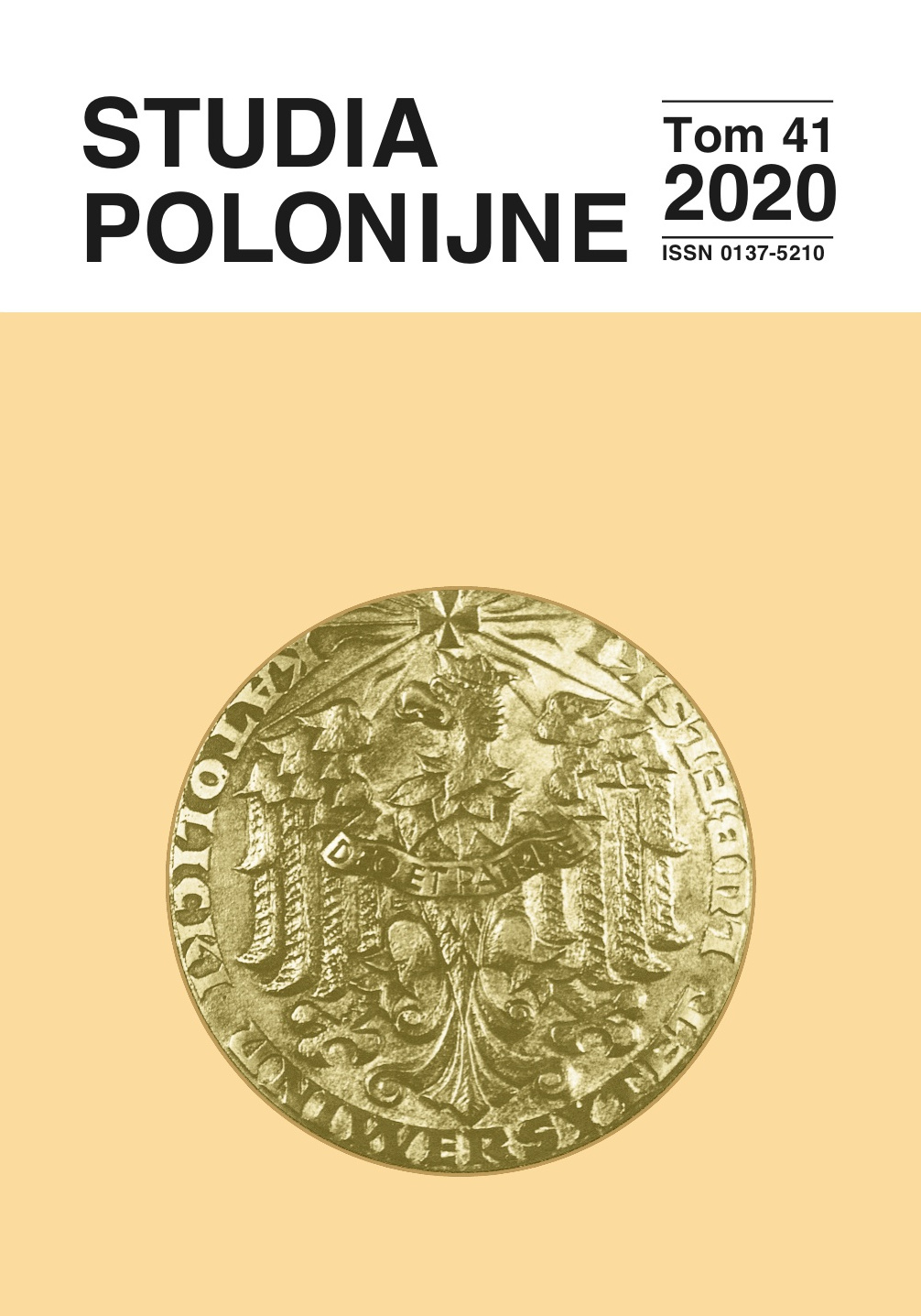„Felix Culpa” of Primate of Poland August Hlond?
Main Article Content
Abstract
The change of the border of Poland after the Second World War and the process of the relocation of Poles to the newly established Polish People’s Republic created a kind of melting pot in the Western and Northern Territories, in which transports arrived from the Eastern Borderlands, Central Poland and Little Poland, as well as from Western countries. In these lands abandoned by Germans, it was the emerging population and religious issues that had the greatest importance. In the post-war reality, the integration process was rather slow in these areas, but it must be noted that the establishment of the organization of the Polish church administration and the pastoral work of the Polish Catholic clergy were invaluable in this matter.
After the war, Primate of Poland August Hlond returned to Poland on 20 July 1945, at a time when the fate of the state borders, of the system and, above all, of the Church, so severely afflicted by the war and occupation, was to be decided. The post-war reforms, which were introduced by communists and justified by democratic phraseology, were aimed at building socialist democracy. The church at that time suffered due to implementing land reform. Another clear warning was the annulment of the concordat by communists on 12 September 1945. As a result of Poland’s isolation from the West, Cardinal Hlond considered it necessary to make decisions about establishing Polish organization and the church hierarchy in the Regained Territories without cooperation with the Holy See. He thought that the German church administration could not be maintained in the former German lands. Moreover, he believed that these organizational and legal actions would prevent the communist government from creating areas without the influence of the Church, or from establishing Polish church organization completely dependent on communists, which was attempted in 1950.
The establishment of the Polish hierarchy in place of the German was seen as lawless in Germany and partly in the Vatican as early as 1945. On 24 October 1945 Cardinal Hlond sent the document (40 pages) to Rome justifying his actions. He stated that seeing the objections expressed by Rome, he realized that he had misinterpreted the powers and instructions of Tardini obtained from the Pope. As a counter-argument, he described the situation in the Recovered Territories and explained that he had had to act quickly in church matters in order to prevent communists from making decisions in this matter, which would have happened if the German church administration had remained. Hlond’s report to Rome was factually credible, and his territorial divisions of the Church and the establishment of the apostolic administrations did not invoke the Pope’s intervention. Soon it transpired that Hlond’s actions were convenient for the Vatican, and thus he saved Catholicism in one of the countries of the Soviet Bloc. That is why Hlond was never disapproved by the Holy See for what he had done.
August Hlond’s beatification process began in 1992. It ended in 1996 at the diocesan level. The Federation of Expellees and the German episcopate were against Hlond’s beatification. In 2017, the Theological Commission of the Congregation for the Causes of Saints gave a positive opinion about the Positio of 2008. In 2018, the same was done by the cardinals and bishops of the Congregation for the Causes of Saints. On 19 May 2018, Pope Francis signed a decree on the heroic virtues of Cardinal Hlond. Since then he has had the title of the Venerable Servant of God.
Article Details
References
Casula C.F., Domenico Tardini 1888-1961, Roma: Edizione Studium Roma 1988.
Dokumentation der Vertreibung der Deutschen aus Ost-Mitteleuropa, t. I: Die Vertreibung der deutschen Bevölkerung aus den Gebieten Östlich der Oder-Neisse, bearbeitet von Th. Schieder, Bonn: Bundesministerium für Vertriebene 1954.
Gigilewicz E., Kaller Maxymilian bp, w: Encyklopedia Katolicka, t. XVIII, Lublin: TN KUL 2000, kol. 406-407.
Groppe L., Kardinal Hlond als seeliger?, „Theologisches” 27 (1997) 3, s. 83-88.
Groppe L., Empfielt sich Kardinal Augustyn [sic!] Hlond als Kandidat einer Seeligsprechung?, „Theologisches” 27 (1997) 7/8, s. 302-306.
Kaps J., Bericht über die Reise eines schlesischen Priesters nach Rom zur Berichterstattung beim Heiligen Stuhl über die Verhältnisse in Breslau und Schlesien, „Archiv für Schlesische Kirchengeschichte“ 38 (1980).
Kaps J., Vom Sterben Schlesischer Priester 1945/46, Köln: Wienand Verlag Köln 1990.
Karp H.-J., Kardinal Hlond und das schwierige deutsch-polnische Verhältnis. Zu den Anfragen vom Franz Scholz, „Zeitschrift für Geschichte und Altertumskunde Ermlands“ 45 (1989), s. 145-164.
Kumor B., Historia Kościoła, część 8: Czasy współczesne 1914-1992, Lublin: Wydawnictwo KUL 1996.
Scholz F., Zwischen Staatsräson und Evangelium. Kardinal Hlond und die Tragödie der ostdeutschen Diözesen, Frankfurt am Main: Knecht 1988.
Snoch B., Górnośląski leksykon biograficzny. Suplement do wydania drugiego, Katowice: Muzeum Śląskie 2006, s. 89.
Zieliński Z., Papieże i papiestwo dwóch ostatnich wieków 1775-1978, Warszawa: Instytut Wydawniczy Pax 1983.

